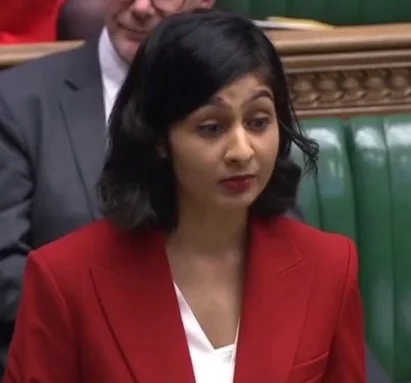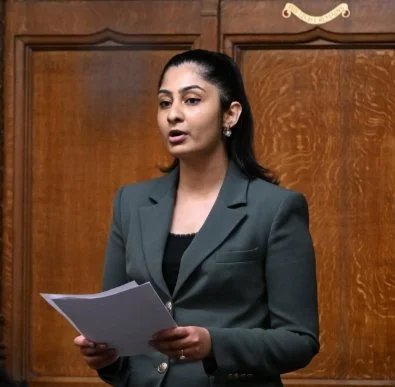The Making of a Moral Politician: How Zarah Sultana’s Values Were Forged by Inequality
Zarah Sultana’s politics were not born from theory, but from experience. Long before she became one of Westminster’s youngest and most outspoken MPs, she was a young woman in Birmingham, watching how poverty, race, and geography determined the contours of people’s lives. Today, she represents Coventry South in Parliament, a constituency shaped by the same inequalities that marked her own upbringing. To understand her fiery moral conviction and refusal to compromise, one must return to those roots. Her politics are not abstract ideals. They are the moral response of someone who saw injustice close up and decided never to accept it as normal.
Formative Years and Early Consciousness
Born in 1993 to a British Kashmiri family, Sultana grew up in Birmingham’s Lozells area, a place that had suffered from years of economic decline. Deindustrialisation and austerity had left scars on local communities, and tensions simmered amid deprivation and disinvestment. Sultana has often recalled how her childhood was shaped by this environment, describing it as a world where “where you come from dictates your opportunities.”
Her early schooling made that lesson painfully clear. Attending a local comprehensive and later a more affluent grammar school for sixth form, she saw inequality not as a statistic but as a social reality etched into the lives of her classmates. The contrast between her own background and the privileges of her peers ignited what psychologists call critical consciousness — the ability to recognise structural injustice and feel compelled to act on it. Sultana’s awareness of class disparities, compounded by racial difference, fostered both anger and empathy. She saw how class, ethnicity, and geography combined to decide who succeeded and who was left behind.
This sense of injustice became her compass. Rather than internalising inequality as fate, she translated it into moral purpose. Her politics began not in the halls of power but in the experience of powerlessness.
The Tuition Fees Generation and Political Awakening
For Sultana’s generation, one policy moment defined their political outlook: the trebling of university tuition fees in 2010. As an 18-year-old watching the Cameron–Clegg coalition push through the decision, she felt betrayed. Her cohort would be the first to pay £9,000 a year for higher education, turning what had been a public good into a personal debt.
Sultana has said that watching Parliament debate tuition fees and seeing the protests that followed “made politics feel real” for the first time. It was no longer a distant institution but a system shaping her future. The sense of outrage that students felt became a gateway to political consciousness. She joined the Labour Party that same year and quickly became active in the “Free Education” campaign and in the National Union of Students, fighting for the very thing she had been denied: access to opportunity unmediated by wealth.
By the time she graduated from the University of Birmingham, Sultana had accumulated nearly £50,000 of debt. But she also left with something more powerful — a political ideology rooted in moral conviction. Her activism around education, austerity, and anti-racism became the building blocks of a worldview that saw inequality as neither inevitable nor accidental, but designed and maintained by political choices.
From Personal Grievance to Collective Morality
What distinguishes Sultana’s politics is the moral charge behind her arguments. When she speaks about student debt, NHS underfunding, or racism, she frames these not as policy failures but as ethical wrongs. In her maiden speech to Parliament in 2020, she called for “an end to 40 years of Thatcherism,” denouncing not just economic policy but the moral logic of individualism that underpinned it. The speech, defiant and unvarnished, startled Westminster for its tone. At just 26 years old, Sultana did not play by the unspoken rule that new MPs should sound deferential. Instead, she treated her platform as a pulpit for moral accountability.
Political psychologists might describe this as moral conviction — the sense that one’s political views are rooted in absolute right and wrong rather than preference or partisanship. People with strong moral conviction are more likely to engage in activism, resist compromise, and persist despite opposition. In Sultana’s case, this conviction stems from a lived encounter with inequality. Her personal story fuels her empathy for others and her unwillingness to dilute her beliefs for convenience.
Social Identity and Solidarity
As a working-class Muslim woman of colour, Sultana embodies multiple social identities that intersect with her political outlook. Social identity theory suggests that people derive part of their self-concept from group membership. When those groups are marginalised, the resulting empathy can extend beyond one’s own experience. Sultana’s politics reflect that widening circle of solidarity. She often speaks of defending “workers’ rights, the NHS, migrant rights, and marginalised communities” in one breath, uniting diverse struggles under a shared moral banner.
Her speeches are threaded with the language of unity: “Muslim brothers and sisters, Jewish comrades, people of all faiths and none.” Such phrasing is not rhetorical flourish but a psychological expression of inclusive identity. It reveals how her sense of belonging is defined by shared struggle rather than narrow tribalism. In a political culture that often rewards conformity, Sultana’s inclusive empathy challenges divisive narratives about race and nationhood.
Moral Courage and Political Risk
Moral conviction, however, comes with costs. Sultana’s refusal to temper her beliefs has made her both admired and attacked. Progressive supporters praise her as authentic and principled, while critics cast her as radical or naive. Yet her consistency in the face of hostility is what makes her a moral politician in the truest sense.
When she defies her party leadership to vote for a Gaza ceasefire or holds up her student loan statement in the Commons, she does so not as a stunt but as a statement of conscience. Her politics are a moral performance, intended to remind the public that politics is not just about policy but about right and wrong.
The backlash she receives — from right-wing media smears to racist abuse — only sharpens that moral clarity. Each attack reinforces her belief that the status quo resists change precisely because it fears moral scrutiny. For Sultana, injustice is not simply an issue to manage but a wrong to confront.
The Psychology of Moral Development
Political psychologists studying sociopolitical development argue that young people exposed to inequality can undergo a process that transforms personal awareness into political action. It begins with recognition of injustice, followed by anger, empathy, and a desire to make change. Sultana’s journey mirrors that model. Her early life offered the raw experiences of deprivation and bias; her student activism provided the tools to analyse them; and her parliamentary career represents the culmination of that developmental arc.
Her story also challenges the cynicism that pervades modern politics. In an era when many see politicians as opportunistic, Sultana’s authenticity stands out. Her values were not crafted in focus groups but in the crucible of inequality. That is why she speaks with moral urgency.
Simply Put: The Moral Compass of a Generation
Zarah Sultana’s political identity is more than a product of ideology; it is the moral outcome of inequality experienced firsthand. The Britain that shaped her — one scarred by austerity, racism, and social division — also produced the empathy and resolve that define her politics. Her journey from the protests over tuition fees to the floor of Parliament reflects the evolution of a moral consciousness into public leadership.
To call her a moral politician is not to idealise her, but to recognise that her politics begin with the question of right and wrong, not what is possible or popular. In that sense, she represents a generation radicalised not by theory but by experience. For many young Britons who feel locked out of opportunity, Sultana’s story is a mirror. It suggests that anger can become ethics, and injustice can become the foundation of conscience.
Her moral compass, forged in inequality, points not toward compromise but toward change. In a political culture too often drained of principle, that conviction is both rare and necessary. Zarah Sultana’s story reminds us that moral politics begins not in Westminster but in the everyday lives of those who refuse to accept injustice as inevitable.
Related Articles:
The Making of a Moral Politician → personal psychology meets moral development.
You Won’t Break My Soul → resilience and mental endurance in the face of hate.
The Double Bind of Diversity → intersectional identity and the politics of perception.
The Cost of Courage → the psychological toll of hate and its impact on democracy.
From Coventry to New York → comparative political psychology, transnational ethics, and identity.
Sources
Zarah Sultana: “You won’t break my soul”








